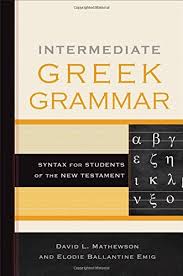
Truth be told, Dan Wallace taught “intermediate Greek” to a generation of students including myself with his Greek Grammar Beyond the Basics. It was well-organized, and pretty much the only book of its kind. It was a natural follow-up to Mounce.
In 2016, times are different. While many of us cut our teeth in Koine Greek on Mounce and Wallace, Biblical Greek studies has interfaced significantly with the study of linguistics in recent years, and it is time to bring those insights to the classroom.
In comes Dave Mathewson and Elodie Ballantine Emig with Intermediate Greek Grammar: Syntax for Students of the New Testament (Baker, 2016). It is intended to be relatively succinct, clear in presentation, and bring cutting edge discussion of NT Greek to the classroom, especially related to verbal aspect theory and discourse analysis.
I am teaching NT Greek this year for the first time in seven years – wow! – so I sat down with this grammar and worked through it. Explanations are clear and fairly represent the state of discussion and honesty with unsettled debates. It is not too technical, and offers loads of examples.
There are many differences between this and Wallace, but one key difference is that Mathewson/Emig focus less on comprehensive categorization, and more on understanding how semantics and pragmatics affect the study of Greek.
OK, here is how I would explain the benefits of Mathewson/Emig over Wallace and others. If Wallace wanted to help students nail down the science of syntax, Matheson/Emig want to help students get just enough of the science to become comfortable with the art of language and syntax. This grammar, intentionally so, is less aimed at being a “reference grammar” and more concerned with setting readers of NT Greek in the right directions with major categories like “genitive” vs. “dative” and “aorist” vs. “present.”
Overall, I am really pleased with this grammar, and I do recommend it. Two little points of criticism, though. Firstly, sometimes Mathewson/Emig use terminology that overlaps with Wallace, but with slightly different meaning, and this can lead to confusion (e.g., “Descriptive genitive”). Secondly, I am not sure what makes this grammar “intermediate.” I wonder whether you get the same value out of Porter’s grammar or Decker’s grammar (in the same series of Mathewson). Is it advanced in any way over these, or perhaps just more to the point? Assumes knowledge of Greek? Not sure.
Don’t let that stop you from having Intermediate Greek Grammar on your bookshelf or in your library. Honestly, it has been helpful for me (as someone not connected to the wonderfully nerdy academic discussions at SBL on Greek) as I prepare to teach my Greek students this year.















